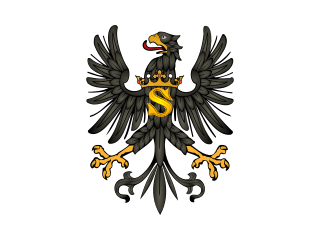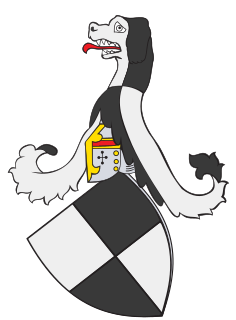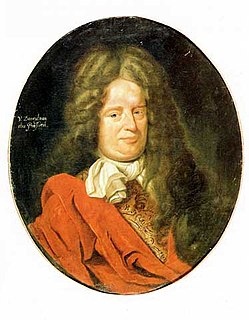
Frederick William was Elector of Brandenburg and Duke of Prussia, thus ruler of Brandenburg-Prussia, from 1640 until his death in 1688. A member of the House of Hohenzollern, he is popularly known as "the Great Elector" because of his military and political achievements. Frederick William was a staunch pillar of the Calvinist faith, associated with the rising commercial class. He saw the importance of trade and promoted it vigorously. His shrewd domestic reforms gave Prussia a strong position in the post-Westphalian political order of north-central Europe, setting Prussia up for elevation from duchy to kingdom, achieved under his son and successor.
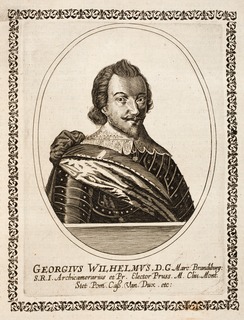
George William, of the Hohenzollern dynasty, was margrave and elector of Brandenburg and duke of Prussia from 1619 until his death. His reign was marked by ineffective governance during the Thirty Years' War. He was the father of Frederick William, the "Great Elector".

John Sigismund was a Prince-elector of the Margraviate of Brandenburg from the House of Hohenzollern. He became the Duke of Prussia through his marriage to Duchess Anna, the eldest daughter of Duke Albert Frederick of Prussia who died without sons. Their marriage resulted in the creation of Brandenburg-Prussia.

Frederick I, of the Hohenzollern dynasty, was Elector of Brandenburg (1688–1713) and Duke of Prussia in personal union (Brandenburg-Prussia). The latter function he upgraded to royalty, becoming the first King in Prussia (1701–1713). From 1707 he was in personal union the sovereign prince of the Principality of Neuchâtel. He was also the paternal grandfather of Frederick the Great.
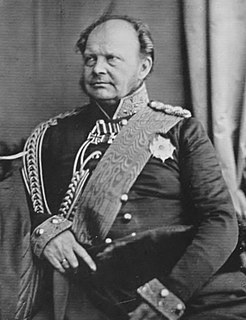
Frederick William IV, the eldest son and successor of Frederick William III of Prussia, reigned as King of Prussia from 1840 to 1861. Also referred to as the "romanticist on the throne", he is best remembered for the many buildings he had constructed in Berlin and Potsdam, as well as for the completion of the Gothic Cologne Cathedral. In politics, he was a conservative, and in 1849 rejected the title of Emperor of the Germans offered by the Frankfurt Parliament as not the Parliament's to give. In 1857, he suffered a stroke and was left incapacitated until his death. His brother Wilhelm served as regent for the rest of his reign and then succeeded him as King.
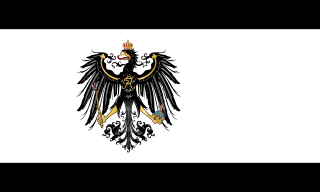
The Kingdom of Prussia was a German kingdom that constituted the state of Prussia between 1701 and 1918. It was the driving force behind the unification of Germany in 1871 and was the leading state of the German Empire until its dissolution in 1918. Although it took its name from the region called Prussia, it was based in the Margraviate of Brandenburg, where its capital was Berlin.

Prussia was a historically prominent German state that originated in 1525 with a duchy centred on the region of Prussia on the southeast coast of the Baltic Sea. It was de facto dissolved by an emergency decree transferring powers of the Prussian government to German Chancellor Franz von Papen in 1932 and de jure by an Allied decree in 1947. For centuries, the House of Hohenzollern ruled Prussia, successfully expanding its size by way of an unusually well-organised and effective army. Prussia, with its capital in Königsberg and from 1701 in Berlin, decisively shaped the history of Germany.

The Silesian Wars were a series of three wars fought in the mid-18th century between Prussia and Austria for control of the Central European region of Silesia. The First (1740–42) and Second (1744–45) Silesian Wars formed parts of the wider War of the Austrian Succession, in which Prussia acted as one member of a coalition seeking territorial gain at Austria's expense. The Third Silesian War (1756–63) was one theatre of the global Seven Years' War, in which Austria in turn led a coalition of powers aiming to seize Prussian territory.

The Duchy of Magdeburg was a province of Margraviate of Brandenburg from 1680 to 1701 and a province of the German Kingdom of Prussia from 1701 to 1807. It replaced the Archbishopric of Magdeburg after its secularization by Brandenburg. The duchy's capitals were Magdeburg and Halle, while Burg was another important town. Dissolved during the Napoleonic Wars in 1807, its territory was made part of the Province of Saxony in 1815.
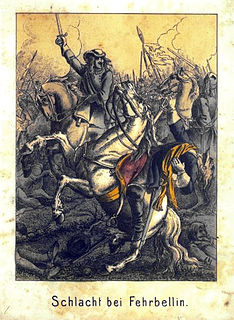
The Battle of Fehrbellin was fought on June 18, 1675, between Swedish and Brandenburg-Prussian troops. The Swedes, under Count Waldemar von Wrangel, had invaded and occupied parts of Brandenburg from their possessions in Pomerania, but were repelled by the forces of Frederick William, the Great Elector, under his Feldmarschall Georg von Derfflinger near the town of Fehrbellin. Along with the Battle of Warsaw (1656), Fehrbellin was crucial in establishing the prestige of Frederick William and Brandenburg-Prussia's army.

The Royal Prussian Army served as the army of the Kingdom of Prussia. It became vital to the development of Brandenburg-Prussia as a European power.

The First Silesian War was a conflict between Prussia and Austria lasting from 1740 to 1742, which resulted in Prussia's seizure of most of the region of Silesia from Austria. The war was fought mainly in Silesia, Moravia and Bohemia and formed one theatre of the wider War of the Austrian Succession. It was the first in a series of three Silesian Wars fought between Frederick the Great's Prussia and Maria Theresa's Austria in the mid 1700s, all three of which ended in Prussian control of Silesia.
Dodo Knyphausen is the name of:

Adam Graf von Schwar(t)zenberg was a German official who advised George William, Elector of Brandenburg, during the Thirty Years' War and served as the Master of the Johanniterorden, the Bailiwick of Brandenburg of the Order of Saint John (1625−41).

John George II, Prince of Anhalt-Dessau was a German prince of the House of Ascania and ruler of the principality of Anhalt-Dessau from 1660 to 1693.

Philip William, Prince in Prussia was a Prussian Prince, was the first owner of the Prussian secundogeniture of Brandenburg-Schwedt and was governor of Magdeburg from 1692 to 1711.
